Research Plan
TAKE ACTION:
Research and Creative
Activities Plan
From ideas to impact: Our research enhances the lives of people in our community, our country, and around the world.
TAKE ACTION:
Research
and Creative
Activities Plan
From ideas to impact: Our research enhances the lives of people in our community, our country, and around the world.
The University of Lethbridge is Iniskim, or Sacred Buffalo Stone, located in the heart of traditional Blackfoot Confederacy territory in Southern Alberta. Through our research and relationships, we will be known to be inviting, expert, provocative, and curious.
We are dynamic by nature; creating, preserving, sharing, and transmitting knowledge. Our research, scholarship, and creative activities are inclusive and demonstrate value for diverse experiences and backgrounds, current and emerging strengths, and the connections we share across disciplines, communities, organizations, and societies.
As a research-intensive university, we celebrate and enhance research ideas and impacts, focusing our efforts to effectively compete and collaborate across areas of both current and emerging strength, institutional uniqueness and differentiation, and place-based distinctiveness.
The Research and Creative Activities Plan balances strategic focus on current and emerging areas of strength with the need to be inclusive and value what makes us unique. We are committed to the academic freedom of our community to carry out research and creative activities, disseminate their findings, and engage in rigorous academic discourse.
FOUNDATIONS:
Indigenous Relationships and Co-Creation
We demonstrate value for relationships through the ways we serve, benefit, and work with the Blackfoot Confederacy and other Indigenous Peoples. We recognize that all research and creative activities can benefit from respecting, learning from, and engaging with the knowledges and cultural traditions, needs, and opportunities identified by and shared with Indigenous partners. Our work animates Canada’s commitments to the Calls to Action in the Truth and Reconciliation Commission report.
SYSTEMS:
People, Ecosystems, and Societies
The inter-connected and interwoven qualities of natural and human ecosystems are embedded in our research, scholarship, and creativity, defining our disciplinary approaches and how we connect with communities and land-based knowledge. We recognize that the complexity of human, ecological, and societal systems are shaped by and, in turn, shape the individuals, organizations, communities, and cultures that interact with them. The role of humans in the world is complex and dynamic and must be addressed through a variety of lenses in ways that reflect our liberal education foundations.
IDEAS:
Emerging and Re-Imagined Knowledge
Discovery and knowledge production are fundamental principles in research, scholarship, and creative activity. The way we understand, share, and transmit knowledge is dynamic and evolves with the ideas generated, identified, and queried in our work. Research at the University of Lethbridge offers new lenses on a multitude of topics and disciplinary knowledge, identity, and citizenship. Our work influences and shifts the paradigm to influence emerging and re-imagined knowledges, technologies, and understandings of intelligence including artificial intelligence and what it means to be a contributing citizen of the world.
PLACES:
Community Engagement and Well-Being
The places where we work are embedded into our very nature: where we live and where we come from shape how we think, learn, and behave. We acknowledge that knowledge production is the basis for all community and well-being research. Advancements in knowledge must encompass the cultural and physical landscapes that contribute both beauty and barriers, addressing access and accessibility, and recognition and understanding of different ways of knowing to take a holistic view of well-being for individuals, communities, and cultures.
Institutional Strengths
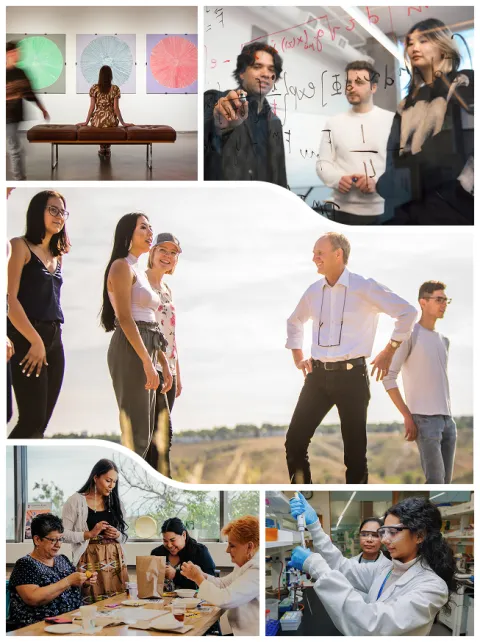
Transformational Learning Experiences
Building on our liberal education philosophy, University of Lethbridge researchers, scholars, and creative artists are committed to gaining fluency with many perspectives.
Strength in Collaborations, Connections, and Diversity
We are proud to engage in meaningful and reciprocal partnerships across our institution, within our region, and throughout Canada and the world.
Undergraduate Research Engagement
Engagement and inclusion of undergraduate students in research and creative activities, providing experiential opportunities, and enhancing both career and personal readiness is a source of pride, impact, and tradition.
Exceeding Expectations
Our ideas and impacts generate outsized, influential, and paradigm-shifting research impact relative to our size, scale, and resources.
Exceptional Infrastructure
Our campuses boast state-of-the-art facilities with skilled staff and accessible, sustainably managed research facilities and we are committed to growing and sustaining new and modernized spaces for research collaboration, community engagement, and scholarly citizenship.
Knowledge Application
Sharing our expertise and learning from others are of paramount importance to effectively practice, apply, and influence our many communities and the wider world.
The Tipi Niitoyis
The Keystone Poles and Supporting Poles
The Research Plan's four strategic directions mirror those in our institutional Strategic Plan but focus specifically on research priorities and initiatives. For comprehensive descriptions of each strategic direction at the institutional level, visit the Strategic Plan.
Challenge boundaries and inspire curiosity
Be a place where people aspire to learn, work and contribute

The Tipi Niitoyis
The Keystone Poles and Supporting Poles
The Research Plan's four strategic directions mirror those in our institutional Strategic Plan but focus specifically on research priorities and initiatives. For comprehensive descriptions of each strategic direction at the institutional level, visit the Strategic Plan.
Challenge Boundaries and Inspire Curiosity
We bring curiosity, imagination, and courage to our activities, creating spaces, systems, and opportunities for interdisciplinary teaching, learning, research, and creative activity to flourish. We break traditional boundaries between academic disciplines, communities, cultures, organizations, and sectors to learn from each other. We create connections that make each of us, and our work together, stronger and more impactful.
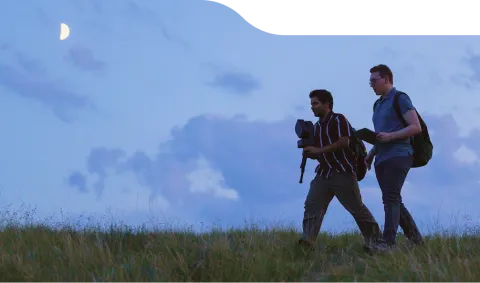
Expand Perspectives
Enhance and support inter- and cross-disciplinary research and creative activities by building funding successes in a more diverse variety of research areas, ensuring and promoting equitable opportunities that are accessible to all researchers at the University of Lethbridge.
Create opportunities to share and promote research and creative outputs in a broad array of venues, media, and formats, including curated and peer reviewed exhibits, installations, podcasts, publications and posters at all stages of research and in recognition of collaborations with local, regional, and national organizations.
Inspire boundless, interdisciplinary teaching, learning, and research
Create internal resources to advance and secure external funding opportunities that promote inter- and cross-disciplinary research, leveraging the principles of Liberal Education, embracing efforts around Indigenization, and building international collaboration and diversity to enhance and engage in impactful research and creative activities.
Celebrate research and creative achievements that challenge boundaries and raise awareness of how these activities animate Our Values (Aitapitsskskaniiyo’pa).
Weave Indigenous knowledges and cultures into all we do
Create, assess, and strengthen supports and ensure accessibility for Indigenous students and faculty to engage in research and creative activity at all levels and with partner institutions.
Encourage and support all researchers to examine methodologies and practices in their disciplines via lenses of two-eyed seeing and Indigenous ways of knowing and thinking.
Strengthen relationships, increase shared initiatives, and co-create externally funded research and creative activities with the partners across the Blackfoot Confederacy.
Challenge Boundaries and Inspire Curiosity
We bring curiosity, imagination, and courage to our activities, creating spaces, systems, and opportunities for interdisciplinary teaching, learning, research, and creative activity to flourish. We break traditional boundaries between academic disciplines, communities, cultures, organizations, and sectors to learn from each other. We create connections that make each of us, and our work together, stronger and more impactful.

Expand Perspectives
Enhance and support inter- and cross-disciplinary research and creative activities by building funding successes in a more diverse variety of research areas, ensuring and promoting equitable opportunities that are accessible to all researchers at the University of Lethbridge.
Create opportunities to share and promote research and creative outputs in a broad array of venues, media, and formats, including curated and peer reviewed exhibits, installations, podcasts, publications and posters at all stages of research and in recognition of collaborations with local, regional, and national organizations.
Inspire boundless, interdisciplinary teaching, learning, and research
Create internal resources to advance and secure external funding opportunities that promote inter- and cross-disciplinary research, leveraging the principles of Liberal Education, embracing efforts around Indigenization, and building international collaboration and diversity to enhance and engage in impactful research and creative activities.
Celebrate research and creative achievements that challenge boundaries and raise awareness of how these activities animate Our Values (Aitapitsskskaniiyo’pa).
Weave Indigenous knowledges and cultures into all we do
Create, assess, and strengthen supports and ensure accessibility for Indigenous students and faculty to engage in research and creative activity at all levels and with partner institutions.
Encourage and support all researchers to examine methodologies and practices in their disciplines via lenses of two-eyed seeing and Indigenous ways of knowing and thinking.
Strengthen relationships, increase shared initiatives, and co-create externally funded research and creative activities with the partners across the Blackfoot Confederacy.
Be a Place Where People Aspire to Learn, Work, and Contribute
Our people are our greatest strength. We grow a culture rooted in curiosity, respect, access, and belonging. We empower student success and provide exceptional experiences and spaces while valuing and supporting our employees in bringing their unique strengths to their work.
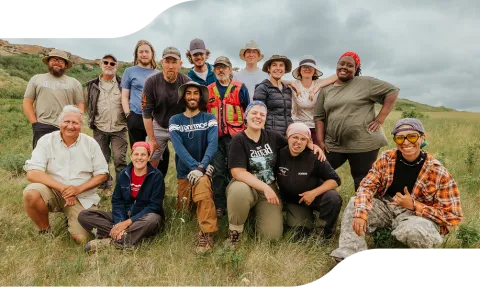
Be a supportive and inclusive environment for all
Create resources, services, and opportunities for equity of engagement and opportunity for all researchers, regardless of stage of development and establishment, to advance and enhance their research and creative practice.
Ensure that our programs, services, and training are focused on building a culture of respect and empathy, including both formal compliance requirements for research ethics and integrity, as well as non-formal and informal offerings that advance Our Values (Aitapitsskskaniiyo’pa).
Deliver an exceptional student experience
Create and sustain celebrations of student achievements, experiences, and contributions to our institutional research and creative activities ideas and impacts.
Deliver exceptional graduate student supervisory and mentorship experiences through expanded programs and participation in professional and co-curricular development, student orientation, and connections to teaching, learning, and community engagement.
Empower talent and inspire professional success
Enhance skills and professional development opportunities for researchers and creative practitioners regardless of stage of development or establishment, including grant writing supports and development, access to training and new professional skills attainment, and opportunities to create new partnerships and relationships within the university community and beyond.
Deliver a proactive service model to empower and inspire research engagement through orientation, mentorship (e.g., SOURCE – Support Outstanding University Research and Creative Excellence), and access to facilities, equipment, and supports that advance research and creative activities.
Be a Place Where People Aspire to Learn, Work, and Contribute
Our people are our greatest strength. We grow a culture rooted in curiosity, respect, access, and belonging. We empower student success and provide exceptional experiences and spaces while valuing and supporting our employees in bringing their unique strengths to their work.

Be a supportive and inclusive environment for all
Create resources, services, and opportunities for equity of engagement and opportunity for all researchers, regardless of stage of development and establishment, to advance and enhance their research and creative practice.
Ensure that our programs, services, and training are focused on building a culture of respect and empathy, including both formal compliance requirements for research ethics and integrity, as well as non-formal and informal offerings that advance Our Values (Aitapitsskskaniiyo’pa).
Deliver an exceptional student experience
Create and sustain celebrations of student achievements, experiences, and contributions to our institutional research and creative activities ideas and impacts.
Deliver exceptional graduate student supervisory and mentorship experiences through expanded programs and participation in professional and co-curricular development, student orientation, and connections to teaching, learning, and community engagement.
Empower talent and inspire professional success
Enhance skills and professional development opportunities for researchers and creative practitioners regardless of stage of development or establishment, including grant writing supports and development, access to training and new professional skills attainment, and opportunities to create new partnerships and relationships within the university community and beyond.
Deliver a proactive service model to empower and inspire research engagement through orientation, mentorship (e.g., SOURCE – Support Outstanding University Research and Creative Excellence), and access to facilities, equipment, and supports that advance research and creative activities.
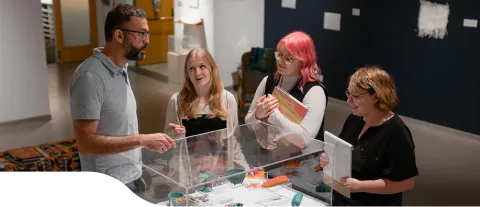
Navigate change with critical insight and resilience
Facilitate research and creative activities that advance the applications and development of digital technologies, such as generative AI and machine learning, through interdisciplinary knowledge creation and impact.
Diversify and strengthen the partnerships and relationships required to sustain, grow, and expand research and creative activities across our campuses and communities.
Contribute to sustainability and climate change solutions
Leverage and secure internal and external resources, partnerships, and funding to incentivize research and creative activities that contribute to the actions laid out in the ULethbridge Sustainability Strategy and Action Plan to address emerging issues and questions of future proofing.
Identify methods, tools and techniques, equipment, and operating and governance models to improve the environmental, social, and financial performance of research and creative spaces.
Enhance financial resilience
Enhance stewardship and synergies between academic research and external partners through the Core Research Facilities and increased visibility and discoverability of our research strengths, capacity, and expertise.
Support growth, diversity, and breadth of external funding opportunities and successes to offset internal financial constraints.

Navigate change with critical insight and resilience
Facilitate research and creative activities that advance the applications and development of digital technologies, such as generative AI and machine learning, through interdisciplinary knowledge creation and impact.
Diversify and strengthen the partnerships and relationships required to sustain, grow, and expand research and creative activities across our campuses and communities.
Contribute to sustainability and climate change solutions
Leverage and secure internal and external resources, partnerships, and funding to incentivize research and creative activities that contribute to the actions laid out in the ULethbridge Sustainability Strategy and Action Plan to address emerging issues and questions of future proofing.
Identify methods, tools and techniques, equipment, and operating and governance models to improve the environmental, social, and financial performance of research and creative spaces.
Enhance financial resilience
Enhance stewardship and synergies between academic research and external partners through the Core Research Facilities and increased visibility and discoverability of our research strengths, capacity, and expertise.
Support growth, diversity, and breadth of external funding opportunities and successes to offset internal financial constraints.
Engage Communities
We build and strengthen positive relationships between people, organizations, and communities, creating connections and understanding based on respect, collaboration, and shared advocacy. Together, we aim to generate knowledge and build capacity, foster mutual growth, address challenges, and create pathways for communities to thrive.
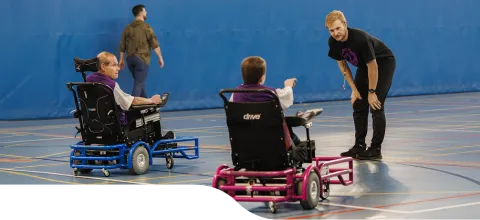
Partner for better solutions
Tell our stories that challenge boundaries and inspire curiosity to engage partners and build relationships across research and creative activities.
Create opportunities for communities to support and engage in research and creative activities through interactive events and celebrations, showcases, workshops and lectures, and dissemination and transfer of knowledge across boundaries.
Advance Reconciliation and strengthen ties with Indigenous communities
Co-create research and creative activities that respect, learn from, and engage with the knowledges and cultural traditions, needs, and opportunities identified by and shared with the Blackfoot Confederacy and other Indigenous Peoples with whom we work, live, and play in Southern Alberta.
Prioritize research and empower researchers, particularly Indigenous researchers, who engage in research that addresses reconciliation with Indigenous people of Canada, and in particular supports institutional commitments to the 94 Calls to Action as identified by the Truth and Reconciliation Commission of Canada.
Thrive together
Collaborate to build and sustain relationships with engaged partners from across Canada and around the world while building deep and resilient community connections that serve as important keystones to our collective success in creating knowledge from ideas to impacts.
Celebrate ideas and impacts across disciplines with both internal and external partners, organizations, foundations, societies, governments, institutions, industries, and agencies.
Engage Communities
We build and strengthen positive relationships between people, organizations, and communities, creating connections and understanding based on respect, collaboration, and shared advocacy. Together, we aim to generate knowledge and build capacity, foster mutual growth, address challenges, and create pathways for communities to thrive.

Partner for better solutions
Tell our stories that challenge boundaries and inspire curiosity to engage partners and build relationships across research and creative activities.
Create opportunities for communities to support and engage in research and creative activities through interactive events and celebrations, showcases, workshops and lectures, and dissemination and transfer of knowledge across boundaries.
Advance Reconciliation and strengthen ties with Indigenous communities
Co-create research and creative activities that respect, learn from, and engage with the knowledges and cultural traditions, needs, and opportunities identified by and shared with the Blackfoot Confederacy and other Indigenous Peoples with whom we work, live, and play in Southern Alberta.
Prioritize research and empower researchers, particularly Indigenous researchers, who engage in research that addresses reconciliation with Indigenous people of Canada, and in particular supports institutional commitments to the 94 Calls to Action as identified by the Truth and Reconciliation Commission of Canada.
Thrive together
Collaborate to build and sustain relationships with engaged partners from across Canada and around the world while building deep and resilient community connections that serve as important keystones to our collective success in creating knowledge from ideas to impacts.
Celebrate ideas and impacts across disciplines with both internal and external partners, organizations, foundations, societies, governments, institutions, industries, and agencies.
